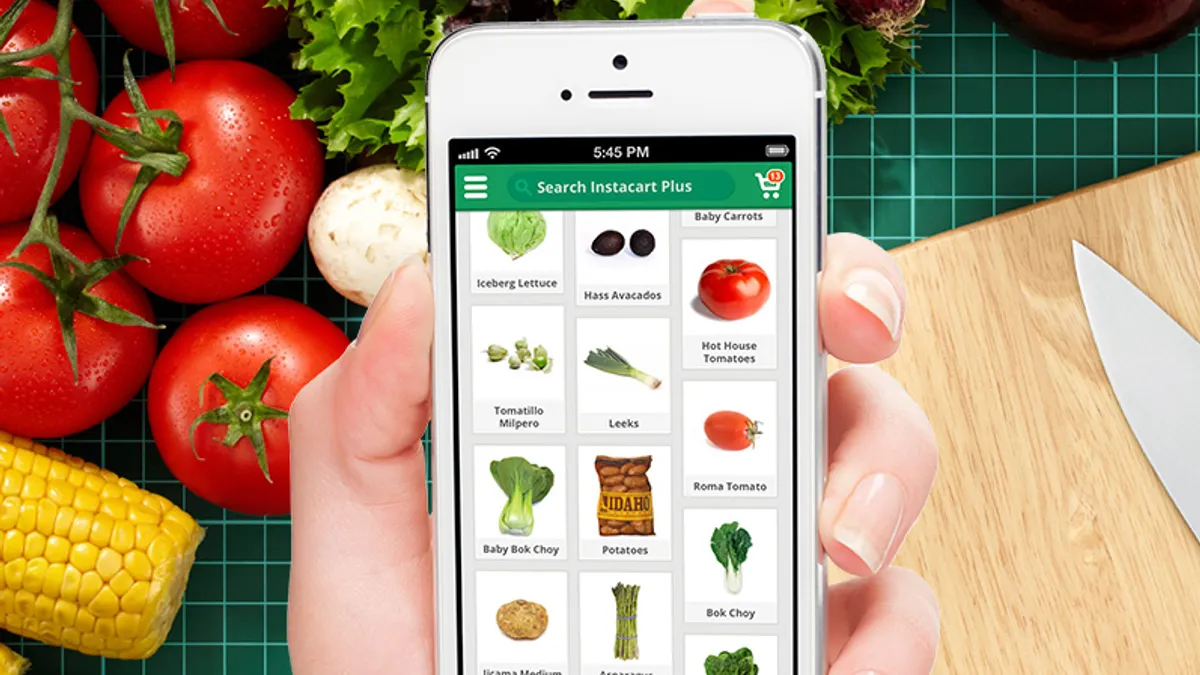Dive Brief:
- Kroger announced it has expanded its same-day delivery service through Instacart, according to a news release. The grocer currently offers home delivery in 45 markets, and partners with Instacart in 27 of those markets, a Kroger spokeswoman told Food Dive. She said Kroger plans to push into 25 new markets with the e-commerce service.
- Kroger said it will also add its ClickList store pickup service to 500 additional stores this year. Currently, the retailer offers Clicklist at 1,091 stores and delivery from 872 locations. Currently, more than two-thirds of Kroger’s customers — 40 million households — have access to curbside pickup, home delivery, or both.
- BJ’s Wholesale Club has also expanded its same-day delivery partnership with Instacart. The club retailer, which first partnered with the company in 2015, said it will offer delivery from all of its 215 stores by the end of April. BJ’s said it will offer special pricing for members, and that members will pay 25% less than they would for delivery from grocery competitors.
Dive Insight:
Both Kroger and BJ’s are eager to meet growing demand from consumers who want to have their bags of chips, fresh meat and prepared meal kits delivered to their doors. But it’s likely competition that forced the hand of both of these retailers.
Kroger is in a click-and-collect arms race with Walmart right now, and just today the mega retailer announced it will offer delivery in 100 markets by the end of this year. Kroger also no doubt has Amazon-Whole Foods on its mind. The specialty grocer recently launched Prime Now delivery in select markets, and plan to expand quickly. Kroger has stolen dollars away from Whole Foods in recent years, and Whole Foods would love nothing more than to return the favor.
Meanwhile, BJ’s has practically been forced to respond to recent moves by Costco and Sam’s Club. The former recently launched its own grocery delivery service and is expanding a pilot partnership with Instacart, while the latter has also signed on with Instacart. Sam’s also recently announced a free two-day shipping service for premium members that’s clearly a response to Amazon’s Prime membership service.
Club stores have been slow to offer online shopping, given their store-centric model. But things are starting to heat up in the channel now.
For Instacart, these deals continue its impressive growth rate and further solidify its position as the number one e-commerce partner for grocers. The company, which not so long ago relied on Whole Foods for a significant percentage of its sales, is now nicely diversified. But it will have to continue expanding and innovating if it hopes to stay ahead of Whole Foods and its deep-pocketed new owner.
In many markets, Instacart is the only game in town. But that's quickly changing, particularly in large cities and suburban areas. How will shoppers and grocers respond? In a recent Forbes column, retail strategist Neil Stern wrote that Instacart carries too many additional fees for its service. It also controls the customer experience, he noted, which retailers are often reluctant to outsource.
“For retailers, there is certainly a risk/reward to aligning with Instacart,” Stern wrote. “Yes, it gets them in the game quickly and with little to no capital, but the process allows a third party to control. Many are offering their own services along with click and collect as a way to provide consumers with multiple options.”









